- Home
- Leslie Meier
Mother's Day Murder Page 13
Mother's Day Murder Read online
Page 13
Takes one to know one, thought Lucy, amused. “She better not do that in front of a jury.”
“You said it,” agreed Ann. “If she pulls a fit like that, she’ll be here for life.”
Chapter Fourteen
April showers were supposed to bring May flowers, but thanks to global warming or climate change or maybe just never predictable New England weather, spring’s advance was put on hold as chilly temperatures, gray skies, and showers stalled over the region. Lucy found it difficult to maintain her usual cheerful outlook on life, and she suspected it wasn’t just the weather. Sara was secretive and hostile at home, and work wasn’t much better, with Ted’s bossy attitude and relentless focus on productivity. Instead of the two or three stories Lucy was used to writing, he now wanted four or five, and Lucy felt the pressure. It made for a lot of tension in the formerly relaxed office.
Lucy found herself looking forward to her Thursday morning breakfast with the girls as an opportunity to blow off some steam and get some positive support, and maybe even some helpful ideas for coping with Sara. But she soon discovered that the girls were just as fixated as everyone else in town on the shooting.
“Doesn’t it bother you that these two women who worked so hard to achieve perfection have come to such tragic ends?” she asked. “It all seems so sad to me.”
“Not to me,” said Sue, thoughtfully tapping her pointed little chin with a scarlet-tipped finger. “What happened to Corinne Appleton, that’s a genuine tragedy, and I can’t imagine what her poor parents are suffering. But Bar and Tina! You reap what you sow, and they weren’t really nice. They were always putting others down in order to make themselves seem better.”
“It’s like what happened to Martha Stewart,” said Pam, nodding her head and making her dangling silver earrings bounce. “A lot of people were happy to see her taken down a peg when she went to jail.”
“I think people find it a relief when these people they thought were so perfect turn out to be no better than anybody else,” said Rachel, fingering the reading glasses she wore on a chain around her neck. “Like suddenly it’s okay to be average.”
“Maybe it’s even better to be average,” said Sue.
“Exactly,” agreed Rachel. “Good enough is just fine.”
“Okay, I understand that,” admitted Lucy. “But do people have to dissect every aspect of their lives? What about those poor girls? They’ve not only lost their mothers but everybody’s talking about their fathers, too.”
“I’m surprised at you, Lucy,” said Pam. “You’re usually so keen on exposing the truth.”
“I feel sorry for Lenny and Bart, too, if you want to know the truth,” said Rachel. “Their wives were so driven and self-centered, when all men really want is a little attention. And now, one’s a widower and the other’s wife is in jail. They’ve actually both lost their wives.”
“You know what would be really funny?” asked Sue, setting down her coffee cup, with a sly smile. “What if the two husbands conspired? After all, they’ve both managed to get rid of their wives now that Tina’s dead and Bar’s in jail.”
“Well, if that’s the case, they’ve seriously miscalculated,” said Lucy, mopping up the last of her egg with the second piece of buttery toast—the one she had vowed not to eat.
“How so?” asked Pam.
Lucy popped the toast in her mouth. “Because now they’re each saddled with a teenage daughter. And those girls make Paris Hilton look like a Girl Scout.”
“Now you’re the one who’s spreading slander,” said Rachel, raising an arched eyebrow. “From everything I’ve seen, they’re attractive, talented, hardworking, high-achieving young ladies with bright futures. And now they’re both missing their moms. It must be awful for them.”
“That may be,” admitted Lucy. “But their own troubles haven’t stopped them from making Sara’s life a living hell, spreading vile rumors about her with their cell phones and computers.”
“Oh, honey,” said Sue, reaching out and patting her hand. “I know you’re feeling like a mother bear ready to defend her cub, but it’s not as bad as you think. It’s the same old, same old. I remember when Sidra was in high school, and somebody started a rumor that she was pregnant when she actually had mono and had to stay out of school for a couple of months.”
“That’s right,” chimed in Pam in a rather superior tone. “That’s why I was so glad to have Tim. Girls are nasty and devious and always have been. It just seems worse now because of text messages and myspace. com.”
“No, it is worse,” insisted Lucy. “When we were in high school, the girls could make fun of your underwear when you changed for gym or tease you about your little boobs or your big butt, but now they have cell phone cameras, and they can take your picture and send it to the entire football team, including your boyfriend.”
“So what? Sara’s got a lovely figure,” said Pam, complacently. “I seem to remember she was running around town in a rather racy little bikini last summer.”
“But this is different,” insisted Lucy, who didn’t like being reminded yet again of the bikini episode. “She was in control when she went out in the bikini, and to tell the truth, I don’t think she had any idea that she was attracting so much attention. And I made her stop as soon as I heard about it. But this is something she has no control over. That’s what’s scary about it. Plus, you wouldn’t believe the mean stuff they’ve been saying about her. They’re claiming that the only reason Chad asked her to the prom is because she promised to have sex with him!” Lucy hadn’t really intended to share this bit of information, but she hoped it would elicit an outpouring of love and support from her friends. She was soon to be disappointed.
“I know it’s upsetting, Lucy,” said Rachel, “but Pam is right. It’s the same stuff that’s been going on forever. It’s just the way the message is delivered that’s different. The expert opinion seems to be that unpleasant as this sort of thing is for the victim, it seems to be a necessary phase of human development that helps teens emerge as caring and compassionate adults.”
“I’m not convinced,” said Lucy, put out at her friends’ lack of outrage. “Maybe instead of turning a blind eye to this electronic bullying, we need to say it’s unacceptable, like underage drinking. Everybody used to just shrug their shoulders at that until Mothers Against Drunk Driving came along and worked hard to change attitudes. Maybe we need to teach tolerance and acceptance if we want our kids to be tolerant and accepting.”
“That’s the other school of thought,” said Rachel. “But I can’t say I’m surprised at this behavior. Just look at their mothers! They used those girls as pawns in their silly little feud. They put so much pressure on them to outdo each other that they’re bound to have inferiority complexes. They can’t possibly live up to their mothers’ expectations.”
“I don’t buy it,” said Lucy. “Heather’s made quite a name for herself as a figure skater. She must have a certain amount of confidence to get out there and compete like that.”
“Maybe,” admitted Rachel. “But you can be sure that unless she’d won the Olympic gold medal, her mother wouldn’t have been satisfied.”
“And now she’s not off the hook,” said Pam. “She probably feels like she has to dedicate every performance to her mom. I’ve seen it happen. The dead mother’s influence gets stronger, like she’s reaching out from the grave.”
Lucy couldn’t agree. “The way she’s behaving toward Sara, I wouldn’t be surprised if Heather pulled a stunt like Tonya Harding and disabled the competition!”
This got a few chuckles, but Lucy hadn’t meant it as a joke.
“It’s Ashley who worries me,” said Sue, frowning. “She volunteered at Little Prodigies last term, and I never saw such a perfectionist. She must have been putting in hours and hours of preparation. If she read a story, she’d make little felt finger puppets of the characters to give to the kids. If they were finger painting, she’d mop up every drop and spatter the minute it happened. She was driv
ing everyone crazy, including the kids. The teachers couldn’t wait for tennis season to start. She’s team captain, but you know what she told me? She said it’s not a big deal, because hardly anybody plays tennis.”
“There are only about six kids on the team,” said Lucy.
“But she won the state championship last year,” said Sue. “She must be very good.”
“You know what I think is so weird about those girls?” asked Pam. “It’s the way they look so much alike. They’re both rail thin. They have those big eyes and identical hairdos. They could be twins. I see them together a lot.”
“Well,” said Rachel. “They have a lot in common. But maybe now that their moms are out of the picture, they’ll eventually be freer to be themselves.”
“Don’t bet on it,” said Sue. “Not for Ashley, anyway. Dr. Bart was all over her when she was working at the preschool. He’d grill her about everything when he came to pick her up. Was she on time? What activities did she offer the kids? Were they successful? On and on it went. It was weird.” She paused, reflecting. “Very controlling. Dominating. I found it disturbing. Creepy, even.”
“It’s hard to believe he could be more controlling than Bar,” said Pam.
“I know,” said Sue, putting her hand to her mouth. “And maybe I’m making too much of this, but you know, there was almost something sexual about it.”
The women exchanged uncomfortable glances.
“That’s really upsetting, if it’s true,” said Rachel.
Sue’s cheeks colored beneath her carefully applied foundation and blush, and she shook her head. “Don’t pay attention to me,” she said, with a rueful grin. “I probably have an overactive imagination.”
Once outside, Lucy took a deep breath of the cool, rain-fresh air and raised her umbrella for the short walk to the office. She usually left the Thursday morning breakfast with a smile on her face, but today it felt like a big cloud of sadness had enveloped her, like those voluminous black chadors that Muslim women had to wear. She was lost in her thoughts, walking slowly past the bank, when she encountered Lenny, who was wearing a tan raincoat and toting an overstuffed briefcase. He was small, she realized, barely an inch taller than she was and probably weighing about the same. His mop of curly hair was the biggest thing about him, but today even it seemed smaller.
“A closing,” he said, seemingly embarrassed about being back at work so soon after his wife’s burial. “It wouldn’t have been fair to my clients to reschedule.”
“Of course not,” said Lucy. “Life goes on.”
“People are so quick to judge,” he said. “I really appreciate the sensitive way you wrote about Tina’s”—his voice caught as he got out the final word—“burial.”
“Just doing my job,” said Lucy, glossing over the fact that she had struggled to write a nonjudgmental account. “I know this must be a hard time for you and Heather. How’s she doing?”
“Better than I expected,” said Lenny. “Of course, kids don’t really understand that death is final, do they?”
“Don’t ask me,” said Lucy, with a shrug. “I only have four kids, and I’m just beginning to figure out what goes on in their heads.”
“You’re way ahead of me then,” said Lenny, resuming the walk to his car.
“You know,” began Lucy, following him, “there is something I think you should know.”
Lenny turned to face her. “About Heather?”
“Yes,” said Lucy, not at all sure she should continue. “I don’t know. Maybe this isn’t a good idea.”
“Well, now that you’ve begun, you’d better tell me, don’t you think?” Lenny sighed. “Otherwise, I’ll worry all day.”
“Okay.” Lucy took a deep breath. “I don’t want to make a big deal about this, after all, I know that Heather is going through a lot right now, but it seems she’s been behaving rather badly to my daughter.”
Lenny furrowed his brows and leaned forward. “In what way?”
“Oh, the usual. Text messages with untrue rumors, embarrassing photos, postings on MySpace, things like that.”
“Sounds pretty typical to me,” said Lenny.
Suddenly Lucy felt exactly like that mother bear Sue had compared her to. She felt herself growing larger as she filled with rage, and it seemed to her, she was towering over teeny little Lenny, ready to swipe him with an enormous clawed paw. She was actually beginning to raise her hand when she caught herself. “I’ve had just about enough of these lame excuses,” she snapped. “Maybe mean girls grow up to be mean women, like two people I could name. And neither one has come to a good end.”
Lenny’s eyes blazed as he struggled to keep his emotions under control. “Okay, so maybe you had your differences with Tina, but she tried her best to be a good mother. Maybe she wasn’t perfect, maybe she stepped on a few toes, maybe she was misunderstood, and maybe a lot of people simply didn’t agree with the positions she took on controversial issues, like a woman’s right to choose and school prayer…” he said, beginning to sound a bit as if he were summing up for a jury. “But I know one thing, and that is that Tina did not deserve to die. She did not deserve to be shot down in cold blood.”
“And my daughter may not be perfect, either,” sputtered Lucy, “but she doesn’t deserve to be tormented by your daughter.”
“That’s rather a strong word, isn’t it?” said Lenny, attempting to walk past Lucy to his car, a beat-up old Volvo, which was parked at the curb.
“No. No,” said Lucy, stepping in front of him and blocking his path. “If you heard your daughter crying night after night, you wouldn’t think it was too strong a word.”
“How do you know I don’t hear my daughter crying, too?” demanded Lenny.
For a moment Lucy was stunned. Was it true? Was Heather sobbing for her mother? Were the hate messages a way for her to distract herself from overwhelming grief? “Is that true?” she asked, her voice almost a whisper. “Is she crying for her mother?”
Lenny dropped his briefcase and shook his head. “Actually, no,” he finally said. “She hasn’t shed a tear, and it worries me.” Standing there on the sidewalk, with his sloping shoulders and slumped back, Lenny seemed like a defeated man.
“Everyone grieves in their own way,” she told him. “There’s no correct way.”
“I know that,” agreed Lenny, “but it doesn’t seem to me that she’s grieving at all, and it worries me.” He paused. “There’s something very hard about Heather. She’s very self-contained. I’ve never known what she was thinking or feeling. I used to tell myself it didn’t really matter, because her mother was pretty much in charge of bringing her up, and I figured she knew best. I mean, I couldn’t really argue with the results. Heather gets top grades. She’s a wonderful skater and may even go to the Olympics. But now you’re telling me she does these mean things to her schoolmates, and I have to admit that I believe you. I don’t want to, but I do.”
“Maybe you should talk to a counselor,” suggested Lucy. “Someone who specializes in adolescent psychology.”
“Maybe you’re right,” said Lenny, picking up his briefcase and sighing. “It never rains, but it pours, right? I mean, here I’ve lost my wife, and now my daughter is acting up, and the thing that really worries me,” he said, staring right into her eyes, “is what will happen to Heather if something happens to me?”
“I don’t think you should worry about that,” said Lucy. “You look pretty healthy to me.”
“It’s not my health. It’s my freedom,” he said, with a little shrug. “I’m a lawyer, I’m trained to consider all the possibilities, and it seems pretty likely that Bar’s lawyers are going to try to paint me as the most obvious suspect. The husband always is.”
“But you couldn’t possibly have done it. You were out in plain view, playing tennis with her, when she was shot.”
“Look, all they have to do is create reasonable doubt. They can imply, even speculate, that I hired somebody to kill her, and had the shooter wear a
blond wig to throw suspicion on Bar.”
“Would that be admissible?”
“No, of course not. But even if the judge tells the jury to disregard it, they’ll have heard it, and the media will pick right up on it. And I think Bob must already have been spinning that story to the cops, because I’ve been asked some pretty strange questions lately by the prosecutors.”
“I don’t think Bob would do anything like that, but Bar herself suggested that you might be involved in some way when I interviewed her the other day,” admitted Lucy.
“She did? God, that woman’s a bitch!” He paused. “Are you going to put it in the paper?”
“I don’t know,” admitted Lucy. “Ted just had me write a short teaser for this week’s paper. I’m supposed to write up the interview for next week’s paper. But if I do put it in, I would get a response from you so you could deny it. That’s standard practice.”
“Fair and balanced, right?” he asked sarcastically.
“We try,” said Lucy.
“Well, if you really want to be fair and balanced, think about this. Maybe Bart’s the one who killed Tina. Maybe he did it to frame his wife. Ever think of that?”
“Not specifically,” said Lucy, “but I have heard a theory that you two conspired to kill one wife and frame the other in order to get both of them out of the way.”
Lenny’s eyes grew big; then he exploded into short, barking laughter. “Small towns, you gotta love them, don’t you? Everybody thinks they know everything, and they actually know nothing.”
“No conspiracy?”
“I wouldn’t give that guy bus fare,” said Lenny. “He’s an obnoxious, stuck-up bastard, and you can quote me on that, if you want.”
“Not really. Ted has a strong desire to stay out of libel court.”
“Too bad,” said Lenny, resuming his walk to the car. “Because the more I think about it, the more I think that framing his wife for Tina’s murder is exactly the sort of weaselly thing Bart Hume would do.”
“And why do you think that?” asked Lucy as he opened the rear car door and slid his briefcase inside.

 Christmas Card Murder
Christmas Card Murder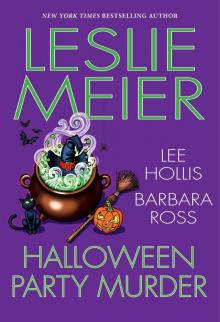 Halloween Party Murder
Halloween Party Murder 'Tis the Season Murder
'Tis the Season Murder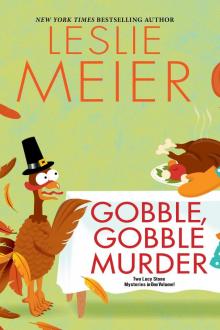 Gobble, Gobble Murder
Gobble, Gobble Murder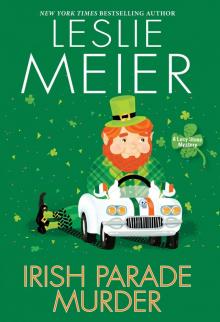 Irish Parade Murder
Irish Parade Murder Bake Sale Murder
Bake Sale Murder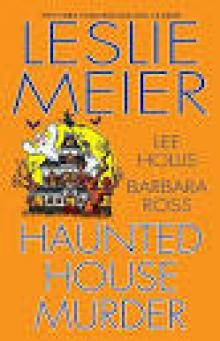 Haunted House Murder
Haunted House Murder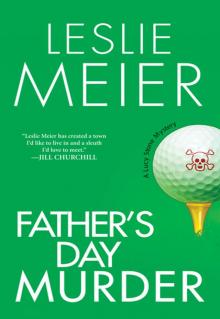 Father’s Day Murder
Father’s Day Murder Chocolate Covered Murder
Chocolate Covered Murder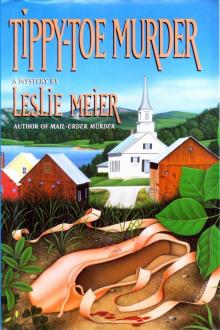 Tippy Toe Murder
Tippy Toe Murder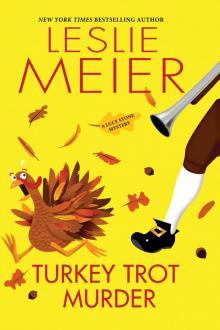 Turkey Trot Murder
Turkey Trot Murder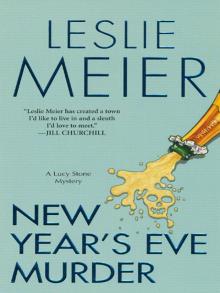 New Year's Eve Murder
New Year's Eve Murder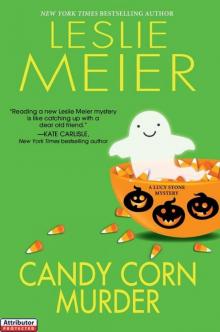 Candy Corn Murder
Candy Corn Murder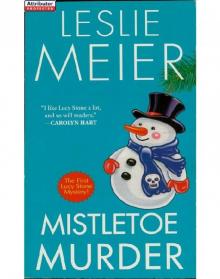 Mistletoe Murder
Mistletoe Murder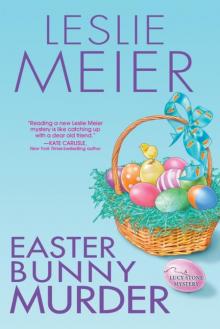 LStone 20 - Easter Bunny Murder
LStone 20 - Easter Bunny Murder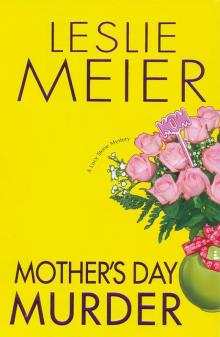 Mother's Day Murder
Mother's Day Murder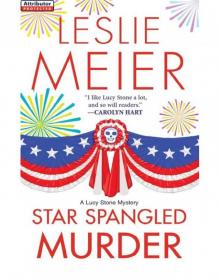 Star Spangled Murder
Star Spangled Murder Silver Anniversary Murder
Silver Anniversary Murder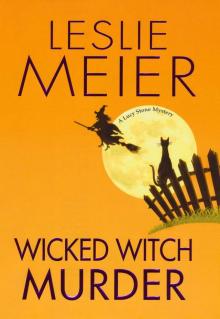 Wicked Witch Murder
Wicked Witch Murder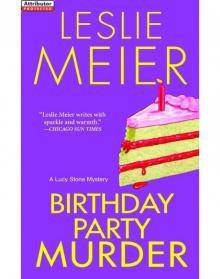 Birthday Party Murder
Birthday Party Murder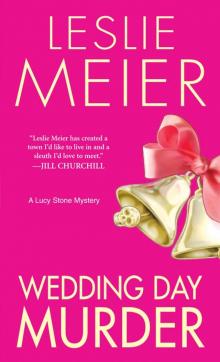 Wedding Day Murder
Wedding Day Murder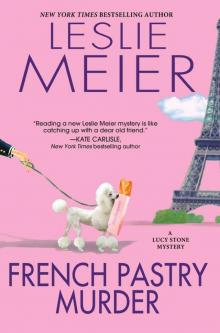 French Pastry Murder
French Pastry Murder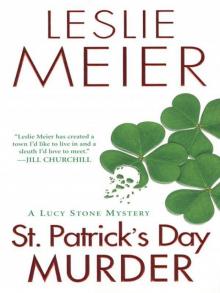 St. Patrick's Day Murder
St. Patrick's Day Murder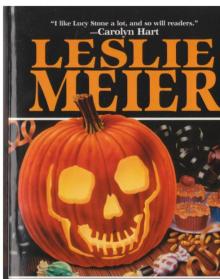 Trick or Treat Murder
Trick or Treat Murder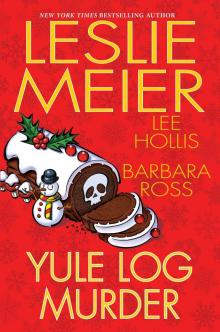 Yule Log Murder
Yule Log Murder Holiday Murder
Holiday Murder British Manor Murder
British Manor Murder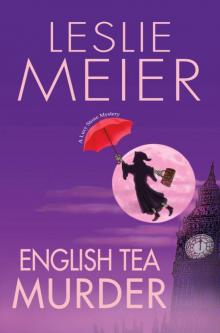 English Tea Murder
English Tea Murder